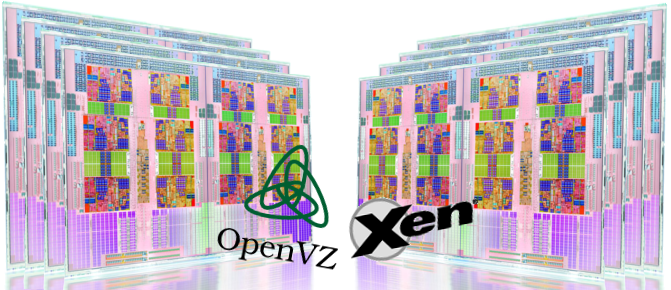
Xen VS OpenVZ
| OpenVZ VPS Hosting | Xen VPS Hosting | |
|---|---|---|
| Speed | Fastest | Fast |
| Custom Kernel Compiling | Not possible | Yes, compile away! |
| VM Isolation | Shares host nodes kernel. Does not have complete isolation. | Complete isolation from other containers. The abuse of other VM’s will not affect yours. |
| Overselling? | Yes, overselling can be done. | Overselling is not allowed. Resources are dedicated. This allows for maximum stability of your VPS. |
| Running Java? | Don’t even look at me. | Look at me. I’ll treat you much better than OpenVZ can. |
| Stability | Least reliable due to not having total isolation – shared kernel. | Most reliable due to having complete isolation. |
“Xen is the platform of alternative for heavy duty, production-grade virtualized deployments, while OpenVZ is optimum for lightweight uses,” explains Solar VPS founder and COO Ross Brouse. “While I’d select Xen nine times out of 10, I know that OpenVZ is a good platform for applications equivalent to DNS and VPN, in addition to SEO optimization, static websites and project-based work.”
XenWith Xen, he says, you run your own instance of the Linux kernel; you’ve virtualized memory, IO and scheduler; and it is typically uninterrupted performance.
OpenVZ, however, is an OS-level virtualization system that runs as a skinny layer on top of the host OS, offering nice velocity and ease of assist for service providers. “They’re both wonderful virtualization platforms that we’ve selected for top performance. OpenVZ tends to be more attractive to Internet developers because it does precisely what they need it to do at an reasonably priced cost.”
Overview
Xen is an open source technology, delivering assist for a range of operating systems together with Windows® and Linux®. The Xen hypervisor is a primary abstraction layer of software that sits instantly on the hardware below any operating system. It’s accountable for CPU-scheduling and memory-partitioning of the various VMs operating on the hardware.
Xen supports running two completely different methods of virtualization: PV and HVM. Both can be used on the similar time on a single Xen system. PV (or paravirtualization) is an efficient virtualization method that doesn’t require virtual extensions from the host. XenPV was designed for working numerous versions of the Linux OS including RedHat (CentOS), Debian, Fedora, SUSE and Gentoo; though every unique OS should be ported.
XenHVM (Hardware Virtual Machine – fully virtualized) requires CPU virtualization extensions from the host (Intel VT, AMD-V). XenHVM is kernel-agnostic and thus helps Windows.
OpenVZ is an open source, software-based virtualization platform built on the Linux kernel and OS (ergo it doesn’t apply to Windows users). It creates isolated, secure environments on a single physical host, permitting for separation of resources and safety between those environments. Every partitioned server performs and executes exactly like a stand-alone server: can be rebooted independently and has unique root entry, users, IP addresses, memory, processes, files, purposes, system libraries and configurations.
Choice Analysis
The Xen platform is more diversified than OpenVZ, that means it helps a wider vary of operating systems. Xen also better emulates a real server environment as its hypervisor-based architecture offers a customizable hardware layer inside the guest system. This provides exceptional management of the hardware and software layers for the end-user.
Whereas Xen is a popular alternative among IT experts, many hosted service suppliers will inform you OpenVZ is a greater match as a consequence of its speed and low price point. OpenVZ additionally offers a particularly agile and expandable hosting environment because of its software-based nature and its potential to share essential system libraries and processes.
“In the long run, when you’re selecting a VPS platform, you want to feel as in the occasion you’re getting a dedicated server for the value of a shared server,” explains Brouse. “We have opted for Xen in past because, after surveying our clients and finding they need the hypervisor setup for business and for Windows, we knew we could depend on Xen implicitly.
“We’ve developed a customized provisioning and administration setup at Solar,” Brouse continues. “We’re now on the verge of providing OpenVZ to our developer clients utilizing Linux in an effort to offer them the greatest bang for his or her buck.”
Finally, every platform affords different advantages. In different phrases, when you consider the large picture, one is not actually better than the other. They’re different; and each is useful to an inhabitants of its own. Whereas Xen reigns supreme by method of stability, OpenVZ provides pace and worth flexibility. “You win with either, and that’s why we’ll offer both,” Brouse says. “We’ve chosen to offer each technologies for the approaching launch of our new Solar System automation platform.”





